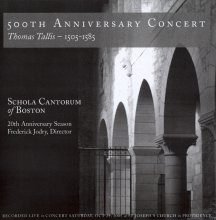







Schola Cantorum
1. Salvator Mundi
The life of Thomas Tallis is a mirror of the musical effects of the Anglican Reformation in England. He lived a remarkable 80 years, and served in the Chapel Royal for some 40, composing under four Monarchs with widely differing religious practices. He began his musical career in the 1530's, first as organist at Dover Priory, and then after the dissolution of the monasteries, he appeared in London as a singer at St. Mary-at Hill. As the winds of Reformation blew ever stronger in England, Henry VIII (reigned 1509-1547) broke with the Roman Catholic Church in order to secure his divorce and to try to produce a male heir. Edward VI (1547-1553) furthered the church reforms, and mandated that the services be sung in English, and that the choral music be brief and succinct "to each syllable a plaine and distincte note". Banished were the enormous milismas -- wherein one word could take a whole page of music! "If ye love me" is the classic example of these new English anthems: mainly homophonic, but with brief moments of imitation. Almost all Tallis' anthem output is in 4 parts (thus endeared to modem church choirs!) but "Blessed be they" requires the favorite Tudor sonority -- high trebles, a middle (or mean) soprano part, and then countertenors, tenors and basses.
-LFJV

500th Anniversary Concert
Recorded Saturday October 29, 2005
To purchase this CD, recorded live in concert,
please send a check for $18
made out to Schola Cantorum of Boston:
Frederick Jodry
209-A Williams Street
Providence RI 02906
Frederick Jodry, Director
Treble: Sherri Dietrich, Emily Hindrichs
Mean: Diana Brewer, Miranda Loud
Countertenor: Christopher Lowrey, Carolann Buff
Tenor: Brian Fehlau, Kyle Hoepner, Arthur Rawding
Bass: Jacob A. Cooper, Frederick Jodry, Bradley Naylor
2. O salutaris Hostia
3. Sermone Blando
4. Missa Puer natus est: Agnus Dei
5. O Lord, give thy holy spirit
6. Hear the voice and prayer
7. Lamentations: Pt. II
8. Suscipe Quaeso
9. If ye love me
10. Blessed are those
11. Gaude gloriosa Dei Mater
Mary Tudor is known as "Bloody Mary", for during her brief reign (1553-1558), some 300 Protestant reformers were burned at the stake. She mandated a return to Catholicism, and several of the pieces on the concert are thought to be composed for her chapel. When in Christmas of 1554 she was presumed to be pregnant by her husband, Phillip VII of Spain, it is likely that Tallis wrote the "Missa puer natus est", where the rich seven voice texture would have been performed by the joined chapels of England and Spain for the Christmas celebrations. Also datable to Mary's reign is the penitential motet "Suscipe queso", whose text would have been suitable for Cardinal Pole's formal absolution of England from heresy. The enormous votive antiphon "Gaude gloriosa" would have likely been written for the full pomp of Marian celebrations - where the Heavenly and Earthly Queen Marys would both be celebrated by this remarkable text.
Tallis was honored by Elizabeth I (reigned 1558-1603) by her granting of a monopoly on the printing of music in England. He issued "Cantiones Sacrae" in 1575, a joint collection by Tallis and Byrd, both holding the position of organist at the Chapel Royal. The preface of this collection, a series of Latin motets, is rather apologetic in tone, carefully balancing the requirements of the Anglican reformed services with Elizabeth's predilection for the Latin Service. In colleges and such places where Latin was understood a motet seems to have been allowed. Such pieces such as "Salvator mundi" and “O salvatoris hostia", which show the Continental influence of regular and constant imitation may have been sung for private services, or domestically.
Locations Past Seasons Reviews Contact Us